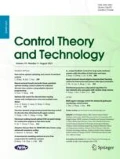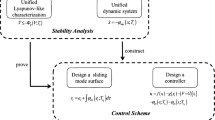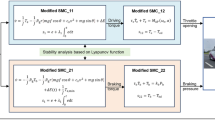Abstract
This paper proposes an adaptive integral higher order sliding mode (HOSM) controller for uncertain systems. Instead of a regular control input, the derivative of the control input is used in the proposed control law. The discontinuous sign function in the controller is made to act on the time derivative of the control input. The actual control signal obtained by integrating the derivative control signal is smooth and chattering free. The adaptive tuning law used in the proposed controller eliminates the need of prior knowledge about the upper bound of the system uncertainties. Stability and robustness of the proposed controller are proved by using the classical Lyapunov criterion. Simulation results demonstrate the advantages of the proposed control scheme.
Similar content being viewed by others
References
F. Ikhouane, M. Krstic. Robustness of the tuning functions adaptive backstepping design for linear systems. IEEE Transactions on Automatic Control, 1998, 43(3): 431–437.
H. K. Khalil. Nonlinear Systems. 3rd ed. Upper Saddle River: Prentice Hall, 2002.
S. V. Emelyanov. Variable structure control systems. Nauka, 1967, 35: 120–125.
W. Gao, J. C. Hung. Variable structure control of nonlinear systems. IEEE Transactions on Industrial Electronics, 1993, 41(1): 45–50.
V. I. Utkin. Sliding Modes in Control and Optimization. Berlin: Springer-Verlag, 1992.
Q. Zong, Z. Zhao, J. Zhang. Higher order sliding mode control with selftuning law based on integral sliding mode. IET Control Theory and Applications, 2010, 4(7): 1282–1289.
K. C. Veluvolu, Y. C. Soh. High-gain observers with sliding mode for state and unknown input estimations. IEEE Transactions on Industrial Electronics, 2009, 56(9): 3386–3393.
C. J. Fallaha, M. Saad, H. Y. Kanaan, et al. Sliding-mode robot control with exponential reaching law. IEEE Transactions on Industrial Electronics, 2011, 58(2): 600–610.
H. Lee, V. I. Utkin. Chattering suppression methods in sliding mode control systems. Annual Reviews in Control, 2007, 31(2): 179–188.
A. Mezouar, M. K. Fellah, S. Hadjeri. Adaptive sliding-mode-observer for sensorless induction motor drive using two-time-scale approach. Simulation Modelling Practice and Theory, 2008, 16(2): 1323–1336.
A. Levant. Sliding order and sliding accuracy in sliding mode control. International Journal of Control, 1993, 58(6): 1247–1263.
A. Levant. Universal single-inputsingle-output (SISO) sliding-mode controllers with finite-time convergence. IEEE Transactions on Automatic Control, 2001, 46(1): 1447–1451.
A. Levant. Finite differences in homogeneous discontinuous control. IEEE Transactions on Automatic Control, 2007, 52(7): 1208–1217.
A. Levant. Higher-order sliding modes, differentiation and outputfeedback control. International Journal of Control, 2003, 76(9/10): 924–941.
A. Levant. Quasi-continuous high-order sliding-mode controllers. IEEE Transactions on Automatic Control, 2011, 50(11): 1812–1816.
I. Eker. Second-order sliding mode control with experimental application. ISA Transactions, 2010, 46(3): 394–405.
B. Feng, G. Ma, Q. Wen, et al. Robust chattering-free sliding mode control of space robot in task space. Journal of Control Theory and Applications, 2008, 6(2): 146–152.
T. Kuo, Y. Huang, S. Chang. Sliding mode control with self-tuning law for uncertain nonlinear systems. ISA Transactions, 2008, 47(2): 171–178.
J. Fei, C. Batur. A novel adaptive sliding mode control with application to MEMS gyroscope. ISA Transactions, 2009, 48(1): 73–78.
R. Wai, L. Chang. Adaptive stabilizing and tracking control for a nonlinear inverted-pendulum system via sliding-mode technique. IEEE Transactions on Industrial Electronics, 2006, 53(2): 674–692.
Y. Huang, T. Kuo, S. Chang. Adaptive sliding-mode control for nonlinear systems with uncertain parameters. IEEE Transactions on Systems, Man, And Cybernetics - Part B: Cybernetics, 2008, 38(2): 534–539.
H. F. Ho, Y. Wong, A. B. Rad. Adaptive fuzzy sliding mode control with chattering elimination for nonlinear SISO systems. Simulation Modelling Practice and Theory, 2009, 17(7): 1199–1210.
F. Plestan, Y. Shtessel, V. Bregeault, et al. New methodologies for adaptive sliding mode control. International Journal of Control, 2010, 83(9): 1907–1919.
W. Li, P. Liu. Adaptive tracking control of an MEMS gyroscope with H-infinity performance. Journal of Control Theory and Applications, 2011, 9(2): 237–243.
S. Laghrouchea, F. Plestanb, A. Glumineaub. Higher order sliding mode control based on integral sliding mode. Automatica, 2007, 43(3): 531–537.
S. P. Bhat, D. S. Bernstein. Geometric homogeneity with applications to finite-time stability. Mathematics of Control, Signals, and Systems, 2005, 17(2): 101–127.
M. Defoort, T. Floquet, A. Kokosyd, et al. A novel higher order sliding mode control scheme. System & Control Letters, 2009, 58(2): 102–108.
A. F. Filippov. Differential equations with discontinuous right-hand side. American Mathematical Society Translations, 1964, 42: 199–231.
Y. Wang, X. Zhang, X. Yuan, et al. Position-sensorless hybrid sliding-mode control of electric vehicles with brushless DC motor. IEEE Transactions on Vehicular Technology, 2011, 60(2): 421–432.
H. Li, X. Liao, C. Li, et al. Chaos control and synchronization via a novel chatter free sliding mode control strategy. Neurocomputing, 2011, 74(17): 3212–3222.
N. Zhang, M. Yang, Y. Jing, et al. Congestion control for Diffserv network using second-order sliding mode control. IEEE Transactions on Industrial Electronics, 2009, 56(9): 3330–3339.
S. Mondal, C. Mahanta. Nonlinear sliding surface based second order sliding mode controller for uncertain linear systems. Communications in Nonlinear Science and Numerical Simulation, 2011, 16(9): 3760–3769.
V. I. Utkin, K. K. D. Young. Methods for constructing discontinuity planes in multidimensional variable structure systems. Automatic Remote Control, 1978, 39: 1466–1470.
K. D. Young, V. I. Utkin, U. Ozguner. A control engineers guide to sliding mode control. IEEE Transactions on Control System Technology, 1999, 7(3): 328–342.
S. Skogestad. Simple analytic rules for model reduction and PID controller tuning. Journal of Process Control, 2003, 13(4): 291–309.
W. Chang, S. Shih. PID controller design of nonlinear systems using an improved particle swarm optimization approach. Communications in Nonlinear Science and Numerical Simulation, 2010, 15(11): 3632–3639.
Author information
Authors and Affiliations
Corresponding author
Additional information
Sanjoy MONDAL received his B.Tech and M.Tech degree in Electrical Engineering from National Institute of Technology, Durgapur, India. Currently, he is a Ph.D. candidate at the Department of Electronics and Electrical Engineering, Indian Institute of Technology Guwahati, India. His research interests include sliding mode control and robust control.
Chitralekha MAHANTA received her M.Tech and Ph.D. degrees in Electrical Engineering from Indian Institute of Technology Delhi, India. Currently, she is an associate professor in the Department of Electronics and Electrical Engineering, Indian Institute of Technology Guwahati, India. Her research interests include control theory application, robust control and intelligent control.
Rights and permissions
About this article
Cite this article
Mondal, S., Mahanta, C. Adaptive integral higher order sliding mode controller for uncertain systems. J. Control Theory Appl. 11, 61–68 (2013). https://doi.org/10.1007/s11768-013-1180-5
Received:
Revised:
Published:
Issue Date:
DOI: https://doi.org/10.1007/s11768-013-1180-5




